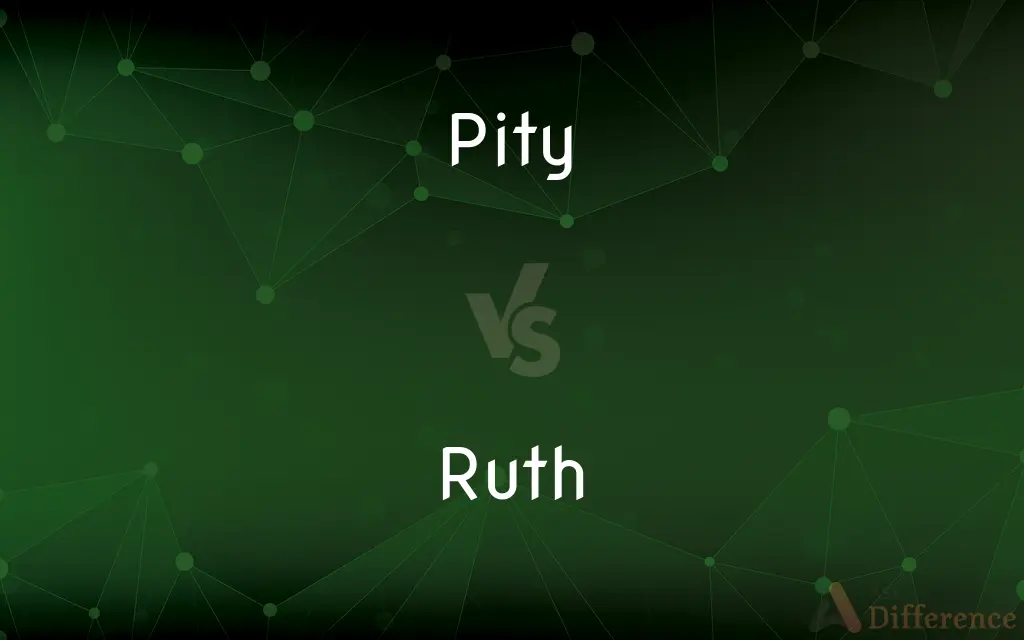Pity vs. Ruth — What's the Difference?
By Urooj Arif & Maham Liaqat — Updated on April 1, 2024
Pity involves feelings of sorrow for someone's misfortune, often with a desire to help, while ruth, an archaic term, denotes a deeper, more personal sorrow or regret.

Difference Between Pity and Ruth
Table of Contents
ADVERTISEMENT
Key Differences
Pity is an emotional response characterized by feelings of compassion towards someone who is suffering or facing misfortune, often accompanied by a desire to alleviate their distress. It implies a sense of superiority or distance, as the observer is not directly affected by the situation. Ruth, on the other hand, is a more archaic and less commonly used term that refers to a profound feeling of sorrow, regret, or compassion that one might feel deeply and personally, often implying a closer identification with the sufferer's pain.
While pity can sometimes be viewed as condescending or superficial, since it does not necessarily involve a deep emotional connection to the person's suffering, ruth suggests a depth of feeling that stems from a genuine sense of shared humanity or personal regret. This difference highlights the intensity and authenticity of the emotional response to others' pain or misfortune.
Pity is often expressed in acts of kindness or offers of help, motivated by the observer's recognition of the sufferer's plight. Ruth, in its historical usage, was associated with a more profound inner sorrow or guilt, reflecting a deeper level of empathy and personal distress over someone else's suffering or one's own actions.
The use of pity in modern language is far more prevalent than ruth, which is largely obsolete and primarily found in historical texts or literary works. This reflects a shift in how emotions are described and the evolving nature of language in expressing compassion and empathy.
Choosing between expressing pity or invoking the concept of ruth depends on the depth of the emotional connection to the suffering experienced or witnessed. While pity might be offered in a broader range of less personal contexts, ruth, were it still widely used, would likely denote a more intimate or profound sense of shared sorrow or regret.
ADVERTISEMENT
Comparison Chart
Definition
Compassion or sorrow for someone's misfortune
Deep regret or sorrow, often for someone else's suffering
Connotation
Can be seen as condescending or superficial
Implies a deeper, more personal sorrow or empathy
Commonality
Widely used in modern language
Archaic and rarely used today
Emotional Depth
Often superficial, with a desire to help
Deep and personal, with a sense of shared humanity
Usage Context
General compassion towards others' suffering
More profound and personal sorrow or regret
Compare with Definitions
Pity
A feeling of sorrow and compassion caused by the suffering and misfortunes of others.
She felt pity for the homeless people she passed on the street.
Ruth
A deep regret or sorrow for someone else's suffering or for one's own actions.
He felt a profound sense of ruth for his harsh words.
Pity
Often involves an element of superiority or distance.
His offer of assistance was made more out of pity than respect.
Ruth
Reflects a deep level of empathy and personal distress.
Her ruth over the incident led her to seek forgiveness.
Pity
Can lead to acts of kindness or charity.
Moved by pity, they started a fundraiser for the disaster victims.
Ruth
Suggests a more intimate or profound sorrow.
Ruth for the misdeeds of his youth plagued him in later years.
Pity
Does not necessarily imply a deep emotional connection.
Pity for her situation prompted him to donate, though he didn't know her well.
Ruth
Implies a closer identification with the sufferer's pain.
The story of her struggles moved him to ruth.
Pity
Common in everyday language to express sympathy.
They sent a card out of pity for her loss.
Ruth
Often found in literary or historical contexts.
The novel depicted the character's ruth with poignant clarity.
Pity
Pity is a sympathetic sorrow evoked by the suffering of others, and is used in a comparable sense to compassion, condolence or empathy - the word deriving from the Latin pietās (etymon also of piety). Self-pity is pity directed towards oneself.
Ruth
See Table at Bible.
Pity
Sympathy and sorrow aroused by the misfortune or suffering of another.
Ruth
Compassion or pity for another.
Pity
A matter of regret
It's a pity she can't attend the reception.
Ruth
Sorrow or misery about one's own misdeeds or flaws.
Pity
To feel pity for or on account of
"No, he could not believe it a bad house.
Not such a house as a man was to be pitied for having" (Jane Austen). "An office worker pitied his confinement and slipped in to give him a loaf of bread" (Eric Scigliano).
Ruth
(archaic) Sorrow for the misery of another; pity, compassion; mercy.
Pity
To feel pity.
Ruth
Repentance; regret; remorse.
Pity
(uncountable) A feeling of sympathy at the misfortune or suffering of someone or something.
I can't feel any pity towards the gang, who got injured while attempting to break into a flat.
Take pity on someone
Ruth
(obsolete) Sorrow; misery; distress.
Pity
(countable) Something regrettable.
It's a pity you're feeling unwell because there's a party on tonight.
What a pity about the band breaking up. I loved them!
Ruth
(obsolete) Something which causes regret or sorrow; a pitiful sight.
Pity
(obsolete) Piety.
Ruth
That which causes pity or compassion; misery; distress; a pitiful sight.
It had been hard this ruth for to see.
With wretched miseries and woeful ruth.
Pity
(transitive) To feel pity for (someone or something).
You have got to pity the guy - he lost his wife, mother and job in the same month.
Ruth
United States professional baseball player famous for hitting home runs (1895-1948)
Pity
To make (someone) feel pity; to provoke the sympathy or compassion of.
Ruth
The great-grandmother of king David whose story is told in the Book of Ruth in the Old Testament
Pity
Short form of what a pity.
Ruth
A feeling of sympathy and sorrow for the misfortunes of others;
The blind are too often objects of pity
Pity
Piety.
Ruth
A book of the Old Testament that tells the story of Ruth who was not an Israelite but who married an Israelite and who stayed with her mother-in-law Naomi after her husband died
Pity
A feeling for the sufferings or distresses of another or others; sympathy with the grief or misery of another; compassion; fellow-feeling; commiseration.
He that hath pity upon the poor lendeth unto the Lord.
He . . . has no more pity in him than a dog.
Pity
A reason or cause of pity, grief, or regret; a thing to be regretted.
What pity is itThat we can die but once to serve our country!
Pity
To feel pity or compassion for; to have sympathy with; to compassionate; to commiserate; to have tender feelings toward (any one), awakened by a knowledge of suffering.
Like as a father pitieth his children, so the Lord pitieth them that fear him.
Pity
To move to pity; - used impersonally.
It pitieth them to see her in the dust.
Pity
To be compassionate; to show pity.
I will not pity, nor spare, nor have mercy.
Pity
A feeling of sympathy and sorrow for the misfortunes of others;
The blind are too often objects of pity
Pity
An unfortunate development;
It's a pity he couldn't do it
Pity
The humane quality of understanding the suffering of others and wanting to do something about it
Pity
Share the suffering of
Common Curiosities
Does expressing ruth imply guilt?
Ruth can imply guilt, especially if it relates to sorrow or regret over one's own actions, but it can also simply denote a profound feeling of empathy for another's suffering.
Can feeling pity lead to meaningful help?
Yes, feelings of pity can inspire individuals to offer practical help and support to those suffering, although the quality of this help may vary based on the depth of understanding and empathy.
Is pity always a negative emotion?
Not necessarily; while pity can sometimes be perceived as condescending, it can also motivate positive actions and support towards those in need.
How do cultural perceptions of pity and ruth differ?
Cultural perceptions vary widely, with some cultures valuing a deep, empathetic connection to others' suffering (closer to ruth) and others viewing pity as a necessary but superficial social response.
Can someone feel both pity and ruth for the same situation?
Theoretically, yes, as one might initially feel pity from a distance and, upon closer connection or understanding, experience a deeper sense of ruth.
Why is ruth rarely used in modern language?
Ruth has become archaic as language has evolved, and its sentiments are often expressed with other terms like "remorse" or "compassion" in contemporary usage.
How can one transform pity into a more positive force?
By ensuring that actions inspired by pity are respectful and empowering, not merely driven by a sense of obligation or superiority.
Can literature and art change perceptions of pity and ruth?
Literature and art play significant roles in exploring and challenging perceptions of these emotions, potentially deepening our understanding and empathy.
How can one cultivate a deeper sense of empathy, akin to ruth, in everyday life?
Cultivating a deeper sense of empathy involves actively listening, seeking to understand others' experiences, and reflecting on one's own responses to suffering.
Are there any positive aspects of ruth?
The deep empathy and regret associated with ruth can lead to sincere apologies, meaningful change, and efforts to alleviate others' suffering.
Is it important to move beyond pity to more actionable forms of empathy?
Yes, transforming pity into actionable empathy ensures that support is meaningful and respects the dignity of those being helped.
How do personal experiences influence one's likelihood to feel pity or ruth?
Personal experiences, especially those involving similar suffering or regret, can make individuals more susceptible to feeling deep empathy or ruth.
How do expressions of pity and ruth impact relationships?
Genuine expressions of either emotion can strengthen relationships through shared understanding and compassion, but superficial pity can sometimes harm or belittle.
In what ways can society encourage more genuine forms of empathy?
By promoting understanding, respect, and equality, society can encourage empathy that respects individual dignity rather than fostering superficial pity.
What are the limitations of pity in addressing systemic issues?
While pity can motivate immediate help, addressing systemic issues requires a deeper understanding and commitment to structural changes.
Share Your Discovery

Previous Comparison
Discourage vs. Stop
Next Comparison
Asymmetric vs. UnsymmetricalAuthor Spotlight
Written by
Urooj ArifUrooj is a skilled content writer at Ask Difference, known for her exceptional ability to simplify complex topics into engaging and informative content. With a passion for research and a flair for clear, concise writing, she consistently delivers articles that resonate with our diverse audience.
Co-written by
Maham Liaqat














































